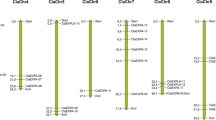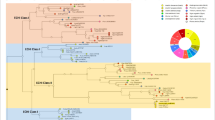Abstract
Chitinases are pathogenesis-related proteins, which play an important role in plant growth regulation, defense mechanism, and stress tolerance. Embryogenic cultures from Vitis vinifera cv. Tempranillo exposed to in vitro stress exhibited the expression of an extracellular class IV endochitinase VvChit-IV. Phylogenetic and conserved motif analyses provided insights into the evolutionary relationships of chitinases. A computation-based investigation showed conserved domains and illustrated a chitin-binding site for chitin cleavage with a catalytic domain of glycoside hydrolase. Interestingly, gene expression pattern showed a differential expression of VvChit-IV associated with embryonic stress response to in vitro conditions. In response to in vitro stress, transcript level of VvChit-IV increased in embryogenic calli and cell suspensions and peaked at 1.5 and 3 folds, respectively, when compared to an internal reference gene. Evidence of tissue culture stress-induced endochitinase was reported here for the first time indicating that in vitro stress could mitigate elicitor application to induce chitinase expression and can stimulate an immune response against abiotic constraints. Data showed that up-regulation of VvChit-IV was associated with a substantial increase of H2O2 and proline without significant change in malondialdehyde content suggesting that the H2O2 signaling network might trigger a priming effect to boost the defense response against environmental stress. Endochitinase activation in plant stress mitigation was thus highlighted to improve tolerance through attenuation of oxidative stress. This study revealed that the grapevine endochitinase is promising for enhancing coping-oriented adaptation and abiotic stress tolerance, which gives new insights into its feasibility for use in cross-tolerance and crop improvement.







Similar content being viewed by others
References
Abraham E, Hourton-Cabassa C, Erdei L, Szabados L (2010) Methods for determination of proline in plants. Methods Mol Biol 639:317–331. https://doi.org/10.1007/978-1-60761-702-0_20
Akimoto C, Aoyagi H, Dicosmo F, Tanaka H (2000) Synergistic effect of active oxygen species and alginate on chitinase production by Wasabia japonica cells and its application. J Biosci Bioeng 89(2):131–137. https://doi.org/10.1016/s1389-1723(00)88726-5
Ali M, Li QH, Zou T, Wei AM, Gombojav G, Lu G, Gong ZH (2020) Chitinase gene positively regulates hypersensitive and defense responses of pepper to Collectotrishum acutatum infection. Int J Mol Sci 21:6624. https://doi.org/10.3390/ijms21186624
Ali S, Ganai BA, Kamili AN, Bhat AA, Mir ZA, Bhat JA, Tyagi A, Islam ST, Mushtaq M, Yadav P, Rawat S, Grover A (2018) Pathogenesis-related proteins and peptides as promising tools for engineering plants with multiple stress tolerance. Microbiol Res 212:29–37. https://doi.org/10.1016/j.micres.2018.04.008
Arraes FBM, Beneventi MA, Lisei de Sa ME, Paixao JFR, Albuquerque EVS, Marin SRR, Purgatto E, Nepomuceno AL, Grossi-de Sa MR (2015) Implications of ethylene biosynthesis and signaling in soybean drought stress tolerance. BMC Plant Biol 15:213. https://doi.org/10.1186/s12870-015-0597-z
Bates LS, Waldren RP, Teare ID (1973) Rapid determination of free proline for water-stress studies. Plant Soil 39:205–207. https://doi.org/10.1007/BF00018060
Békésiova B, Hraska S, Libantova J, Moravcikova J, Matusikova I (2008) Heavy-metal stress induced accumulation of chitinase isoforms in plants. Mol Biol Rep 35:579–588. https://doi.org/10.1007/s11033-007-9127-x
Ben-Amar (2021) Seretome-derived cultured cell system: overview towards extracellular protein characterization and biotechnological applications. J Basic Appl Sci 17:13–24. https://doi.org/10.29169/1927-5129.2021.17.02
Ben-Amar A, Cobanov P, Boonrod K, Bouzid S, Ghorbel A, Krczal G, Reustle G (2007) Efficient procedure for grape embryogenic suspensions establishment and plant regeneration: role of conditioned medium in cell proliferation. Plant Cell Rep 26:1439–1447. https://doi.org/10.1007/s00299-007-0341-8
Ben-Amar A, Reustle G (2013) Extracellular proteins induced plant cell proliferation. In: Zhang C, Zeng X (eds) Cell proliferation: processes, regulation and disorders. Nova Biomedical, New York, pp 65–80
Benson EE, Magill WJ, Bremner DH (1997) Free radical processes in plant tissue cultures: implications for plant biotechnology programmes. Phyton, special issue "Free Radicals" 37:31–38
Botelho RV, Roberti R, Tessarin P, Garcia-Mina JM, Rombolà AD (2015) Physiological responses of grapevine to biodynamic management. In: Renewable Agriculture and Food System 31:5. https://doi.org/10.1017/S1742170515000320
Busam G, Kassemeyer HH, Matern U (1997) Differential expression of chitinases in Vitis vinifera L. responding to systemic acquired resistance activators or fungal challenge. Plant Physiol 115(3):1029–1038. https://doi.org/10.1104/pp.115.3.1029
Cao S, Wang Y, Li Z, Shi W, Gao F, Zhou Y, Zhang G, Feng J (2019) Genome-wide identification and expression analyses of the chitinases under cold and osmotic stress in Ammopiptanthus nanus. Genes 10:472. https://doi.org/10.3390/genes10060472
Cassells AC, Joyce SM, O’Herlihy EA, Perez-Sanz MJ, Walsh C (2002) Stress and quality in in vitro culture. Acta Hort. https://doi.org/10.17660/ActaHortic.2003.625.16
de Klerk GJ (2007) Stress in plants cultured in vitro. Propagation of Ornemental Plants 7(3):129–137
Desjardins Y, Dubuc J, Badr A (2009) In vitro culture of plants: a stressful activity! Acta Hort 812:29–50. https://doi.org/10.17660/ActaHortic.2009.812.1
Egertsdotter U, von Arnold S (1998) Importance of arabinogalactan proteins for development of somatic embryos of Norway spruce (Picea abies). Physiol Plant 93:334–345. https://doi.org/10.1111/j.1399-3054.1995.tb02237.x
Enoki S, Suzuki S (2016) Pathogenesis-related proteins in grape. In: Morata A, Loira I (eds.), Grape and Wine Biotechnology. Intech Open, Rijeka, Croatia, pp 43–58.
Gonzalez-Bosch C (2018) Priming plant resistance by activation of redox-sensitive genes. Free Radical Biol Med 122:171–180. https://doi.org/10.1016/j.freeradbiomed.2017.12.028
Grover A (2012) Plant chitinases: genetic diversity and physiological roles. Crit Rev Plant Sci 31:57–73. https://doi.org/10.1080/07352689.2011.616043
Hodges DM, Delong JM, Forney CF, Prange RK (1999) Improving the thiobarbituric acid-reactive-substances assay for estimating lipid peroxidation in plant tissues containing anthocyanin and other interfering compounds. Planta 207:604–611. https://doi.org/10.1007/s00425-017-2699-3
Hong JK, Hwang BK (2006) Promoter activation of pepper class II basic chitinase gene, CAChi2, and enhanced bacterial disease resistance and osmotic stress tolerance in the CAChi2 overexpressing Arabidopsis. Planta 223:433–448. https://doi.org/10.1007/s00425-005-0099-6
Hossain MA, Bhattacharjee S, Armin SM, Qian P, Xin W, Li HY, Burritt DJ, Fujita M, Tran LSP (2015) Hydrogene peroxide priming modulates abiotic oxidative stress tolerance: insights from ROS detoxification and scavenging. Front Plant Sci 6:420. https://doi.org/10.3389/fpls.2015.00420
Jabeen N, Chaudhary Z, Gulfraz M, Rashid H, Mirza B (2015) Expression of rice chitinase gene in genetically engineered tomato confers enhanced resistance to Fusarium wilt and early blight. Plant Pathol J 31(3):252–258. https://doi.org/10.5423/PPJ.OA.03.2015.0026
Kesari P, Patil DN, Kumar P, Tomar S, Sharma AK (2015) Structural and functional evolution of chitinase-like proteins from plants. Proteomics 15:1693–1705. https://doi.org/10.1002/pmic.201400421
Kikuchi T, Masuda K (2009) Class II chitinase accumulated in the bark tissue involves with the cold hardiness of shoot stems in highbush blueberry (Vaccinium corymbosum L.), and characterization of plant chitinase with a novel domain combination from lycophyte Selaginella doederleinii. Biosci Biotechnol Biochem 82:1742–1752. https://doi.org/10.1016/j.scienta.2008.11.007
Kuba Y, Takashima T, Uechi K, Taira T (2018) Purification, cDNA cloning and characterization of plant chitinase with a novel domain combination from lycophyte Selaginella doederleinii. Biosci Biotech Biochem 82(10):1742–1752. https://doi.org/10.1080/09168451.2018.1491285
Kumar S, Stecher G, Li M, Knyaz C, Tamura K (2018) MEGA X: molecular evolutionary genetics analysis across computing platforms. Mol Biol Evol 35:1547–1549. https://doi.org/10.1093/molbev/msy096
Liu X, Yu Y, Liu Q, Deng S, Jin X, Yin Y, Guo J, Li N, Liu Y, Han S, Wang C, Hao D (2020) A Na2CO3-responsive chitinase gene from Leymus chinensis improve pathogen resistance and saline-alkali stress tolerance in transgenic tobacco and maize. Front Plant Sci 11:504. https://doi.org/10.3389/fpls.2020.00504
Lu S, Wang J, Chitsaz F, Derbyshire MK, Geer RC, Gonzales NR, Gwadz M, Hurwitz DI, Marchler GH, Song JS et al (2019) CDD/SPARCLE: the conserved domain database in 2020. Nucleic Acids Res 48:D265–D268. https://doi.org/10.1093/nar/gkz991
Nakamura T, Ishikawa M, Nakatani H, Oda A (2008) Characterization of cold-responsive extracellular chitinase in bromegrass cell cultures and its relationship to antifreeze activity. Plant Physiol 147:391–401. https://doi.org/10.1104/pp.106.081497
Oyeleye A, Normi YM (2018) Chitinase: diversity, limitations and trends in engineering for suitable applications. Biosci Rep 38:BSR2018032300. 10.1042/BSR20180323
Patil RS, Ghormade V, Deshpande MV (2000) Chitinolytic enzymes: an exploration. Enzyme Microb Tech 26:473–483. https://doi.org/10.1016/s0141-0229(00)00134-4
Patterson BD, Macrae EA, Ferguson IB (1984) Estimation of hydrogen peroxide in plant extracts using titanium (IV). Anal Biochem 139:487–492. https://doi.org/10.1016/0003-2697(84)90039-3
Robinson SP, Jacobs AK, Dry IB (1997) A class IV chitinase is highly expressed in grape berries during ripening. Plant Physiol 114(3):771–778. https://doi.org/10.1104/pp.114.3.771
Saitou N, Nei M (1987) The neighbor-joining method: a new method for reconstructing phylogenetic trees. Mol Biol Evol 4:406–425. https://doi.org/10.1093/oxfordjournals.molbev.a040454
Sen A (2012) Oxidative stress studies in plant tissue culture. Intech Open, Rijeka, Croatia, pp 59–87. https://doi.org/10.5772/48292
Seo PJ, Lee AK, Xiang FN, Park CM (2008) Molecular and functional profiling of Arabidopsis pathogenesis-related genes: insights into their roles in salt response of seed germination. Plant Cell Physiol 49:334–344. https://doi.org/10.1093/pcp/pcn011
Si T, Wang X, Zhao C, Huang M, Cai J, Zhaou Q, Dai T, Jiang D (2018) The role of hydrogen peroxide in mediating the mechanical wounding-induced freezing tolerance in wheat. Front Plant Sci 9:327. https://doi.org/10.3389/fpls.2018.00327
Singh A (2014) Isolation and expression of a chitinase family protein AT4G01700 from Arabidopsis thaliana. Austr J Biotechnol Bioeng 1(4):7. https://doi.org/10.7150/thno.7811
Slesak I, Libik M, Karpinska B, Kapinski S, Miszalski Z (2007) The role of hydrogen peroxide in regulation of plant metabolism and cellular signalling in response to environmental stresses. Acta Biochem Pol 54(1):39–50. https://doi.org/10.18388/abp.2007_3267
Su Y, Xu L, Wang S, Wang Z, Yang Y, Chen Y, Que Y (2015) Identification, phylogeny, and transcript of chitinase family genes in sugarcane. Sci Rep 5:10708. https://doi.org/10.1038/srep10708
Szklarczyk D, Gable AL, Lyon D, Junge A, Wyder S, Huerta-Cepas J, Simonovic M, Doncheva NT, Morris JH, Bork P et al (2018) STRING v11: protein–protein association networks with increased coverage, supporting functional discovery in genome-wide experimental datasets. Nucleic Acids Res 47:D607–D613. https://doi.org/10.1093/nar/gky1131
Thompson J, Higgins D, Gibson T (1994) CLUSTAL W: improving the sensitivity of processive multiple sequence alignment through sequence weighting, position-specific gap penalties and weight matrix choice. Nuc Acid Res 22(22):4673–4680. https://doi.org/10.1093/nar/22.22.4673
Van Hengel A, Tadesse Z, Immerzeel P, Schols H, Van Kammen A, De Vries SC (2001) N-Acetylglucosamine and glucosamine-containing Arabinogalactan proteins control somatic embryogenesis. Plant Physiol 125(4):1881–1890. https://doi.org/10.1104/pp.125.4.1880
Velikova V, Yordanov I, Edreva A (2000) Oxidative stress and some antioxidant systems in acid rain-treated bean plants: protective role of exogenous polyamines. Plant Sci 151:59–66. https://doi.org/10.1016/S0168-9452(99)00197-1
Wasternack C (2007) Jasmonates: an update on biosynthesis, signal transduction and action in plant stress response, growth and development. Ann Bot-London 100:681–697. https://doi.org/10.1093/aob/mcm079
Watanabe A, Nong VH, Zhang D, Arahira M, Yeboah NA, Udaka K, Fukazawa C (1999) Molecular cloning and ethylene-inducible expression of Chib1 chitinase from soybean Glycine max L. Biosci Biotechnol Biochem 63:251–256. https://doi.org/10.1271/bbb.63.251
Waterhouse A, Bertoni M, Bienert S, Studer G, Tauriello G, Gumienny R, Heer FT, De Beer TAP, Rempfer C, Bordoli L, Lepore R, Schwede T (2018) SWISS-MODEL: homology modeling of protein structures and complexes. Nuc Acid Res 46(W1):W296–W303. https://doi.org/10.1093/nar/gky427
Widiastuti A, Yoshino M, Hasegawa M, Nitta Y, Sato T (2013) Heat shock-induced resistance increases chitinase-1 gene expression and stimulates salicylic acid production in melon (Cucumis melo L.). Physiol Mol Plant Pathol 82:51–55. https://doi.org/10.1016/j.pmpp.2013.08.003
Yildiz M (2011) Evaluation of the effect of in vitro stress and competition in tissue culture response of flax. Biol Plant 55(3):541–544. https://doi.org/10.1007/s10535-011-0121-8
Zhu T, Deng X, Zhou X, Zhu L, Zou L, Li P, Zhang D, Lin H (2016) Ethylene and hydrogen peroxide are involved in brassinosteroid-induced salt tolerance in tomato. Sci Rep 6:35392. https://doi.org/10.1038/srep35392
Žiarovská J, Zamiešková L, Bilcíková J, Fialková V, Sabo J, Kunová S, Kacániová M (2020) Expression of specific class I chitinase mRNA levels in different grape varieties and their antimicrobial activity. Agronomy 10:1176. https://doi.org/10.3390/agronomy10081176
Zuckerkandl E, Pauling L (1965) Evolutionary divergence and convergence in proteins. In: Bryson V, Vogel HJ (eds) Evolving Genes and Proteins. Academic Press, New York, pp 97–166
Acknowledgements
We are grateful to Dr. Goetz Reustle and Dr. Pascal Cobanov (AlPlanta-Institute for Plant Research, Germany) for kindly providing embryogenic material and for helpful discussion.
Funding
The work was supported by the Tunisian Ministry of Higher Education and Scientific Research. AB received a financial support for scholarship in Germany.
Author information
Authors and Affiliations
Contributions
AB conceived and designed the study, conducted the experiment, and wrote the manuscript. DA performed biochemical assays and statistical analysis. AB, DA, and AM contributed in reviewing, editing, and approving the final manuscript.
Corresponding author
Ethics declarations
Competing interests
The authors declare no competing interests.
Additional information
Handling Editor: Peter Nick
Publisher’s note
Springer Nature remains neutral with regard to jurisdictional claims in published maps and institutional affiliations.
Rights and permissions
About this article
Cite this article
Ben-Amar, A., Allel, D. & Mliki, A. Up-regulation of a stress-responsive endochitinase VvChit-IV in grapevine cell cultures improves in vitro stress tolerance. Protoplasma 259, 1189–1203 (2022). https://doi.org/10.1007/s00709-021-01733-y
Received:
Accepted:
Published:
Issue Date:
DOI: https://doi.org/10.1007/s00709-021-01733-y




